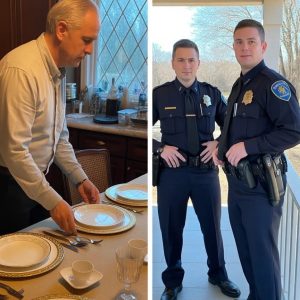I asked the woman from the church pantry. She just sighed and said, “It’s not the cats I worry about. It’s who they’re waiting for.”
That stuck with me.
Because when she said it, she looked down the road, like she expected someone to walk up any second.
I kept thinking about it all that night. Who could they be waiting for? Why leave cats in an old junked car? Why keep feeding them but never show your face?
The next morning, I walked to the warehouse. The air smelled of wet concrete and rust. The car sat there like always, its blue paint barely showing through flakes of brown. The cats blinked at me from the windows. One stretched across the back seat, another leapt onto the hood as if guarding the others.
I crouched and whispered, “Who takes care of you?”
The cats only blinked, tails flicking, eyes reflecting the pale light.
That evening, I brought a small can of tuna and set it by the curb. I didn’t see anyone, but the next morning the can was gone—clean, as though washed and carried away.
It became a routine. Every couple of days I’d leave food. And every time, it vanished by sunrise. The cats grew more curious about me. They began meowing softly when I came near, rubbing against the cracked door frame, watching me with calm, trusting eyes.
But I never saw the other person.
Until one night.
It was late—nearly midnight. I had trouble sleeping and decided to walk to clear my head. The street was quiet, just the distant hum of a truck on the highway. As I neared the warehouse, I spotted movement. A small figure hunched by the car, a flashlight dimly glowing.
I froze behind a stack of pallets. The figure opened a bag and set down bowls of food, patting each cat on the head. The way they leaned in, the cats knew this person. They weren’t scared—they purred and rubbed against their legs like family.
The figure adjusted the towel on the dashboard, then reached into their pocket. They pulled out a folded paper, slipped it carefully under the wiper blade, and stood there for a long moment, looking at the car.
Then they walked off down the alley, disappearing into the night.
I didn’t chase after them. Something about the way they moved—slow, heavy, like every step carried a weight—made me hesitate.
The next morning, the note was still there.
I don’t know what possessed me, but I slid it out. It was written in shaky handwriting:
“I’ll be back when I can. Take care of them if you see this. Please.”
No name. No explanation. Just that.
For days, I couldn’t stop thinking about it. Who wrote it? Why leave? Were they sick? Hiding? Running from something?
Then, one Saturday, I caught another glimpse. Not at night this time—broad daylight. I was biking past when I saw her. An older woman, maybe late sixties, wearing a faded denim jacket. She knelt beside the car, murmuring softly to the cats.
I slowed but didn’t stop. She glanced up, and for a brief second, our eyes met. Hers were tired, but there was a sharpness in them, like she’d lived through more than most could handle.
I wanted to say something. But before I could, she turned, walked into the warehouse lot, and was gone.
Over the next weeks, I tried to catch her again. I left notes tucked under the wiper: “I see you take care of them. Can we talk?” None were answered.
But the cats stayed healthy. Someone was still looking after them, maybe both of us.
And then the twist came.
One rainy night, I saw flashing lights. Two police cars parked near the warehouse. Officers with flashlights combed the area. The cats huddled inside the car, eyes wide. I hurried closer, pretending to be curious like any other bystander.
One officer muttered to the other, “She’s back. Neighbors reported seeing her.”
The other officer sighed. “She’s not dangerous. Just stubborn. Poor woman’s been living like this since her boy died.”
That made me stop cold.
Her boy?
I lingered until they left, but they didn’t find her. They left behind only wet footprints and whispers.
Later, I pieced it together through town gossip. The woman’s name was Marta. Years ago, her son was in a car accident not far from the warehouse. The very car now filled with cats had once belonged to him.
After he died, she couldn’t bring herself to part with it. She dragged it behind the warehouse, where no one would tow it. And for reasons no one really understood, cats started showing up. Strays, lost, abandoned—they all found their way there.
Marta began feeding them, believing they were a sign. Some folks said she thought her son’s spirit was with them. Others whispered she just needed something to care for, to fill the hole he’d left.
Whatever the truth, she kept coming back, even when police tried to move her along. Even when the warehouse changed owners. Even when neighbors complained.
And suddenly, the sigh from the church lady made sense. “It’s not the cats I worry about. It’s who they’re waiting for.”
They were waiting for Marta.
One afternoon, I finally caught her again. She was sitting on a crate, brushing one of the cats with an old comb. Her jacket was soaked from drizzle, but she didn’t seem to notice.
I walked over slowly. “Hi,” I said softly. “I’ve seen you here.”
She glanced at me warily. “Lots of people walk by.”
“But not many bring food.”
Her eyes narrowed, then softened. She nodded once. “You’re the one who leaves tuna.”
I smiled. “Guilty.”
For a long moment, she just studied me. Then she patted the crate beside her. I sat.
The cats moved between us like a tide, tails brushing my hands, eyes blinking trust. Marta stroked the one in her lap. “They keep me alive,” she murmured.
I didn’t know what to say.




